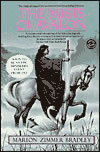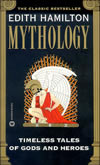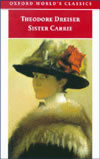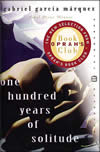
Mists of Avalon
By Marion Zimmer Bradley
This is the Arthurian legend from the women's point of view. Traditionally, these women were depicted as evil or seductive. But in this version, you see them as three-dimensional characters who have issues and who happen to have powers that they use wisely or unwisely. The book is so long, but I've probably read it six times—once when I was in Master Class, my second Broadway play. I went back to it because I was working with such a powerful woman, Zoe Caldwell. She became a mentor to me, so I had to give her a copy, too. To this day, I feel as if Zoe teaches me everything she knows about theater and life, how to exist in it, and how to parent. I even named my daughter after her.
By Marion Zimmer Bradley
This is the Arthurian legend from the women's point of view. Traditionally, these women were depicted as evil or seductive. But in this version, you see them as three-dimensional characters who have issues and who happen to have powers that they use wisely or unwisely. The book is so long, but I've probably read it six times—once when I was in Master Class, my second Broadway play. I went back to it because I was working with such a powerful woman, Zoe Caldwell. She became a mentor to me, so I had to give her a copy, too. To this day, I feel as if Zoe teaches me everything she knows about theater and life, how to exist in it, and how to parent. I even named my daughter after her.

Mythology
By Edith Hamilton
I first became interested in Greek myths when I was in the seventh grade. This is embarrassing, but I actually pretended the Greek gods did exist. When you're that age, it's okay to do that, right? I would say to Zeus and Hera, "I'm sorry no one believes in you anymore, but I know you're there."
When I got to high school, I still had a passion for these stories, and a librarian gave me this book. Hamilton retells many of the well-known Greek and Roman myths. I loved how, in her hands, the gods have such human traits and foibles.
By Edith Hamilton
I first became interested in Greek myths when I was in the seventh grade. This is embarrassing, but I actually pretended the Greek gods did exist. When you're that age, it's okay to do that, right? I would say to Zeus and Hera, "I'm sorry no one believes in you anymore, but I know you're there."
When I got to high school, I still had a passion for these stories, and a librarian gave me this book. Hamilton retells many of the well-known Greek and Roman myths. I loved how, in her hands, the gods have such human traits and foibles.

Gone with the Wind
By Margaret Mitchell
When I was a sophomore at Juilliard, I wanted to visit relatives in Lawrenceville, Virginia, but the only way I could afford to get there was by Greyhound bus. That's an 11-hour drive from New York, so I grabbed Gone with the Wind. I read the first half on the 11 hours down, and the second half on the 11 hours back.
Even though I loved the film, I found the book so much more vivid and emotional—in large part because of the scene where Scarlett and Rhett argue and then he carries her up the stairs in a fit of passion. In the movie, they fade to black and cut to the next morning, hmm... The intensity with which that scene is described in the book is not graphic but so rich and sensuous.
By Margaret Mitchell
When I was a sophomore at Juilliard, I wanted to visit relatives in Lawrenceville, Virginia, but the only way I could afford to get there was by Greyhound bus. That's an 11-hour drive from New York, so I grabbed Gone with the Wind. I read the first half on the 11 hours down, and the second half on the 11 hours back.
Even though I loved the film, I found the book so much more vivid and emotional—in large part because of the scene where Scarlett and Rhett argue and then he carries her up the stairs in a fit of passion. In the movie, they fade to black and cut to the next morning, hmm... The intensity with which that scene is described in the book is not graphic but so rich and sensuous.

Sister Carrie
by Theodore Dreiser
Fisher Stevens, the actor and producer, gave me this book on opening night of my first Broadway show, Carousel. It's about a girl named Carrie who works very hard to become someone. I found it powerful material. Dreiser wrote a devastating love story: A successful man in the middle of his life falls in love with Carrie and is destroyed when she leaves him. He loses everything while she becomes a giant star of the New York stage.
by Theodore Dreiser
Fisher Stevens, the actor and producer, gave me this book on opening night of my first Broadway show, Carousel. It's about a girl named Carrie who works very hard to become someone. I found it powerful material. Dreiser wrote a devastating love story: A successful man in the middle of his life falls in love with Carrie and is destroyed when she leaves him. He loses everything while she becomes a giant star of the New York stage.

The Authoritative Calvin and Hobbes
By Bill Watterson
When I was 21, in my junior year at Juilliard, I had a complete breakdown. I had to leave school, and I couldn't work. I couldn't focus on anything. My mother came to see me and for some reason brought a Calvin and Hobbes collection. It was the first thing I was able to focus on, and, in some strange therapeutic way, it got my mind off my problems. I found such simple joy in this precocious, hysterical yet sweet six-year-old kid and his adventures with his stuffed animal, Hobbes. It was a glimmer of hope that I was coming out of the depression. I wish I could say it was a more profound book, but it was Calvin and Hobbes.
By Bill Watterson
When I was 21, in my junior year at Juilliard, I had a complete breakdown. I had to leave school, and I couldn't work. I couldn't focus on anything. My mother came to see me and for some reason brought a Calvin and Hobbes collection. It was the first thing I was able to focus on, and, in some strange therapeutic way, it got my mind off my problems. I found such simple joy in this precocious, hysterical yet sweet six-year-old kid and his adventures with his stuffed animal, Hobbes. It was a glimmer of hope that I was coming out of the depression. I wish I could say it was a more profound book, but it was Calvin and Hobbes.

One Hundred Years of Solitude
An Oprah's Book Club selection
By Gabriel García Márquez
I found this book on my mother's shelf when I was in high school. It's hard to pick a favorite among his novels, but this was special because I read it first. You can smell where you are in his stories. You can feel it, you can taste it, and you can touch it. Every time I opened this novel, I fell into a time warp and into Colombia at the turn of the last century.
An Oprah's Book Club selection
By Gabriel García Márquez
I found this book on my mother's shelf when I was in high school. It's hard to pick a favorite among his novels, but this was special because I read it first. You can smell where you are in his stories. You can feel it, you can taste it, and you can touch it. Every time I opened this novel, I fell into a time warp and into Colombia at the turn of the last century.




